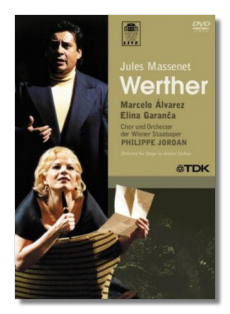
The Internet's Premier Classical Music Source
Related Links
- Massenet Reviews
- Latest Reviews
- More Reviews
-
By Composer
-
Collections
DVD & Blu-ray
Books
Concert Reviews
Articles/Interviews
Software
Audio
Search Amazon
Recommended Links
Site News
 DVD Review
DVD Review
Jules Massenet

Werther
- Marcelo Álvarez – Werther
- Elīna Garanča – Charlotte
- Adrian Eröd – Albert
- Ileana Tonca – Sophie
- Peter Jolosits – Schmidt
- Marcus Pelz – Johann
- Alfred Šramek – La Bailli
- Clemens Unterreiner – Brühlmann
- Maria Gusenleitner – Käthchen
Vienna State Opera Chorus & Orchestra/Philippe Jordan
Recorded Live at the Vienna State Opera, February 25 & 28, 2005
TDK DVWW-OPWER DVD Anamorphic Widescreen LPCM stereo, Dolby Digital 5.0, DTS 5.0
Stage director Andrei Serban has updated this Werther, recorded live at the Vienna Staatsoper in February 2005, to take place during the 1950s. (At the start of Act Three, Charlotte nervously smokes a cigarette and watches television.) In 1950, neither love nor honor were quite what they were in Goethe's time, but let that pass: the updating gives the opera a useful immediacy. Each act is dominated by a tree – in full verdure in Act One, losing its orange leaves in Act Two, and barren in the last two acts. This was not a bad idea either, except I began to wonder whether the main characters in this opera were related to hobbits, or perhaps to those "uncommon" elves who bake cookies sold in your local supermarket, as they kept running up and down the tree and disappearing inside it.
If anything, Serban has too many ideas, and they became jarring in the last two acts. In her "Air des lettres," Charlotte wildly throws Werther's supposedly beloved letters around the stage, and gets a little too intimate (for my tastes, anyway) with a letter-opener. Later, when Sophie arrives to cheer her up, Charlotte compulsively plays solitaire, and there's a nauseating piece of business involving hand puppets (an alligator and a wizard, if you must know), as Sophie entreats Charlotte to leave the house with her. For a production which was designed to seem fresh and new, I was astonished when Charlotte, tense after the unexpected arrival of her husband Albert, shatters the glass from which she is drinking in her hand: a real Carol Burnett-type moment. It gets tackier, though. In the final act, Werther is practically drenched in fake blood, and when he and Charlotte have their final reconciliation, there is so much kissing and passionate rolling around on his death bed that she ends up quite blood-smeared herself. In the meantime, Albert skulks in the shadows watching the whole thing. Werther's "bedroom" appears to be a mattress under the aforementioned tree, with only a dilapidated typewriter to keep him company.
One could reject this arch production of Werther outright were it not for the singing, which is wonderful. Argentinean tenor Marcelo Álvarez was born to sing the title role. His grasp of the French style is sure, and the beauty of his vocalism makes his portrayal a memorable one. (Hearing him after hearing Andrea Bocelli's recent recording of this role would be a sobering and educational experience for the Italian tenor's fans.) Charlotte may be a devoted "mother" to her little brothers and sisters, but there's nothing maternal about the singing of Elīna Garanča, which is feminine and youthful, despite her mezzo-soprano range. She hasn't quite grown into the role – her Act Three solos are not emotionally commanding yet – but her voice is gorgeous, and she looks pretty good in the chic blonde wig that this production has contrived for her. As her little sister Sophie, Ileana Tonca is more a tomboy than a nitwit, particularly in the first act, where the costume designer saddles her with ugly Capri pants and an uglier pair of glasses! (Serban makes it clear that Sophie is smitten with Werther too, suggesting that a different and an altogether happier ending might have resulted if Werther hadn't been such a gloomy Gus.) Eschewing the standard twittering delivery, Tonca does a good job of making Sophie into a "second Charlotte," as the DVD's annotator suggests she is. Albert's role benefits from having a singer as young as Adrian Eröd on hand; Charlotte's dilemma becomes more poignant when it is made clear that there's nothing implausible about her having married this particular wrong man. Serban's directing makes Albert into more of a "heavy," than usual, but Eröd is up to it. The smaller roles are done well, and the children of the Vienna State Opera have a good time not only singing a raucous "Noel! Noel!," but also kicking around a soccer ball and playing with a hula hoop. (The 1950s, remember?) Philippe Jordan makes a positive impression in the orchestra pit.
The opera runs for 132 minutes. There is a 12-minute bonus of Álvarez and Garanča entering the Vienna Opera Ball, singing a flashy zarzuela duet, and being interviewed (also with Serban, set designer Peter Pabst, and Eröd) about the upcoming opening night. Álvarez, answering in Spanish, looks nervous during the interview, but he and Garanča shine during their duet, enjoying a spontaneity and naturalness denied them during the opera itself.
The sound is in the three expected formats, and the picture is Anamorphic Widescreen Widescreen. Fortunately, the English subtitles haven't been updated to match the action onstage! There is a lot of close camera work. This makes some of Álvarez's and Garanča's eye-popping, slavering acting look more extreme than it probably did in the auditorium.
The singers look good, and the singing is quite fine, but it might be better if you kept your eyes closed during this Werther, especially during the last two acts.
Copyright © 2006, Raymond Tuttle




















